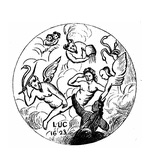
Private Revelations: Authentic, Paranormal & Preternatural
THE ODD CASE OF ADRIENNE VON SPEYR -- PART I
Ours is an age of considerable religious illiteracy. The decline in fealty to mainstream spiritual institutions has been especially precipitous in the past two or three decades. But few can live without some sort of spirituality, and many varieties of “alternative” belief systems have proliferated. As G.K. Chesterton remarked, when people stop believing in Christianity, they don’t come to believe in nothing — they believe in anything. And so we’ve witnessed a striking rise in the West in belief in what’s popularly known as the “parapsychological” or “paranormal.”
The word parapsychology explains nothing; it arose as descriptive of what the materialist view of science (otherwise known as scientism) cannot understand about non-material realities. It is, at heart, a pseudo-scientific term. Yes, parapsychology is generally considered nonsense, but it is taken seriously by many people, whether or not they use that term to describe their own beliefs.
Much of what is mischaracterized as so-called paranormal phenomena may well represent figments of people’s imagination, hoaxes by charlatans, pathology, or sensory misperceptions. But those attracted to the better-known and widely cited parapsychological realities do profess a legitimate evidentiary base of sorts, and these diverse phenomena have a strong spiritual or quasi-spiritual significance to large groups of people. These include those engaging in neo-paganism, witchcraft, astrology, pantheism (or nature worship), schools of higher consciousness, and, most commonly, diverse sorts of modern spiritualism, the latter in many ways the heart of the New Age resurgence.
These movements, however strange, are best countered by sound discernment rather than by dismissal (or ignorance), especially as they grow in popularity.
The most plausible explanation for most paranormal phenomena is the demonic one. This, however, is difficult for most modern Westerners to accept, in large part because today’s secular and even religious worlds no longer believe that evil spirits exist, let alone that they may occasionally stimulate bizarre and misleading phenomena to intentionally confuse humans. This lack of belief flies in the face of man’s long acceptance of the presence of dark entities — however understood — across a wide swath of civilizations. The traditional theological term for what is now called paranormal is preternatural (“beyond nature”), and it typically refers to the diabolic. With this in mind, we can make informed assessments in the field of complex spiritual discernments, a field that otherwise can be highly confusing.
You May Also Enjoy
Sr. Elizabeth Johnson warns that if we take literally the "naming" of God in the "image of powerful men," we turn God into an "idol."
Liberal Catholic theologians cannot brook dissent from their own way of thinking. They won't debate subjects they consider long settled, and will resort to censorship to silence dissent.
The Holy Spirit was urging me to take up my cross and follow Jesus into this blessed wilderness where alone I would find my salvation.

